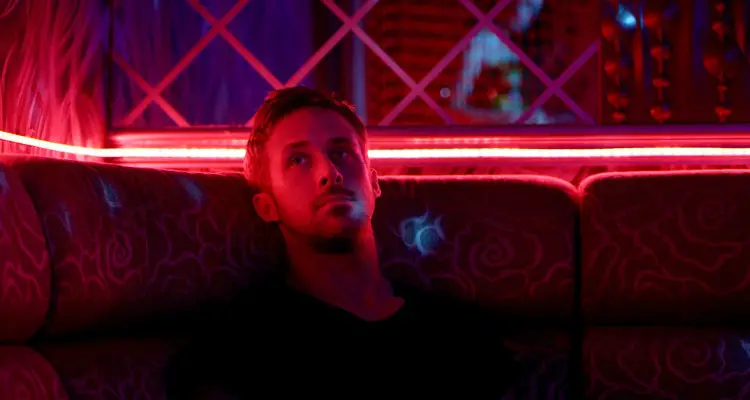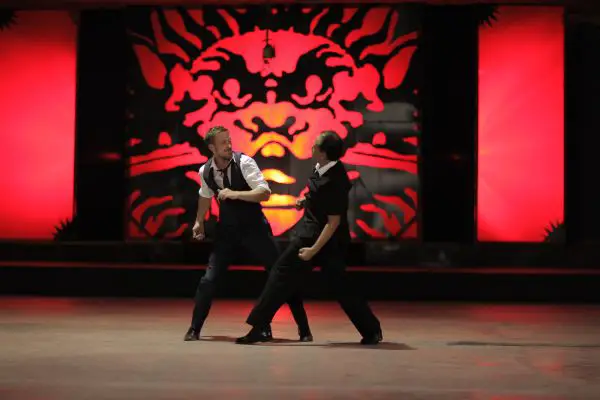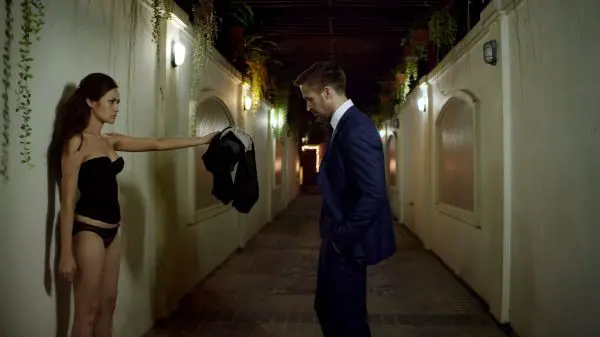ONLY GOD FORGIVES: Different Does Not Equal Bad

Manon de Reeper is the founder and CEO of Film…
Only God Forgives is a movie not for the faint of heart. It’s highly violent and highlights that violence as if it is a virtue. This movie wasn’t received by the critics nor by the public favorably, but I’d like to vouch for this movie.
Danish director see my review here), seems to prefer to depict the highly violent, mentally crazy or damaged men. That much becomes clear again in Only God Forgives.
A Giant Risk
Only God Forgives is far from a standard movie – it’s different in almost every way, and it’s risky. Refn chose not to use music in many scenes, but haunting sounds. He crafted a world that is unknown to many – for once it’s not set in the dark hoods of the U.S., but Bangkok, Thailand. The lighting is unnatural, and that while we’re used to movies in which they try to craft a world that’s as close to reality as possible. Instead, the lighting and colors used give it an otherworldly feel. Occasionally, the narrative is interrupted by strange visions of a dream-like quality, making it unclear what we’re seeing is dream or reality, making it somewhat confusing at times, as well. Lastly, the story and plot is also not what we’re used to. The movie is slow at times, even though a lot happens and the characters don’t show a lot of emotions which makes them hard to read and hard to relate to.
I’m convinced that this was all done intentionally to create a gap between the viewer and the world and characters on screen. As I see it, it wasn’t Refn’s goal to make characters that are relatable – instead, Only God Forgives reads more like an ethnographic study of a world that both fascinates and confounds. Those rare moments the characters do show their emotions makes them raw and harsh – they have become hardened by the world they live in: there is no place for softness, which is signified by the constant use of color red in the lighting. Red often symbolizes anger and hate and are the only emotions presented throughout the movie.
The Pillar of Justice
The story of Only God Forgives discusses justice and what we see as “just”. Police officer Chang (wonderfully and weirdly portrayed by Vithaya Pansringarm) is the pillar of that justice. His acts of violence are often contrasted by odd scenes of him singing on a podium in a bar, watched by his fellow policemen (in amazement? You can hardly tell by their blank faces). In those scenes, Chang’s face is lit by a round spotlight, which gives the strong impression of a halo, suggesting that he is an Angel of Justice, or even God himself. Even his name, Chang, is mythical – Chang means elephant in Thai and the elephant is a holy creature in Thailand, often considered to be the father of Buddha.

I personally do not agree with the idea that many movies subtly influence people with (or, perhaps, it’s the conviction that people already have and it’s reflected in movies – one can never be sure), that crime should be fought with any means possible – that justice has the right to damage, hurt and kill. However, the contrast between Chang’s extreme violence and God-like behavior and the singing in the bar was almost like a parody, like taking the piss with him. I don’t think Chang was truly an Angel of Justice in this movie, but merely fashioned himself to be one and placed himself as such among his colleagues. This to me was signified by the fighting scene in the Muay Thai ring. Julian (Ryan Gosling) and Chang are both lit by the demon-like creature in the back of the room, which to me suggested more that both were demons of an underworld (as the police too has started to resort to evil to fight crime), even suggesting that Chang is the superior one as he knew to beat Julian easily – Julian could not land a single blow.
The Mother’s Power over the Son
Then there’s Julian’s most odd relationship with his mother. The mother, Crystal (Kristin Scott Thomas), stylized after Shakespeare’s Lady Macbeth and fashion designer Donatella Versace, is a drug lord (well, drug lady), high on her own power. She’s deeply involved in the drug business in Thailand but leads from abroad and only comes to Thailand when her son is killed. Her control and power is constantly emphasized by the way she is put in every shot she appears in: always in the middle, always with her shoulders wide – pure dominant posture.

Julian, Crystal’s second-born, suffers greatly from the abuse of his mother. She constantly belittles him, comparing him to his older brother, who, by the way, was killed after he raped and killed an underage prostitute. His mother cares not for her son’s crimes, says “he must have done it for a good reason”, or something along those lines. Julian, instead, did not want to kill the man who killed his brother (the father of the prostitute) exactly because of his brother’s acts. His mother is all-controlling and Julian has no autonomy whatsoever, not in the business, not personally, not sexually (which is why he cannot have a normal relationship with a woman). To me it was so much more powerful that it was the mother, for once, who was the boss of this drug empire. The mother holds a lot of power over the son, which was presented in this movie beautifully.
The Lesser Demon in Asian Sin City
Chang, the cop, is more like a red herring or even a plot device in this movie than anything else – mostly, it is about this abusive relationship between Julian and his mother. That confrontation between Chang and Julian was not what’s important, it’s that moment that Julian kills the assassin he’s with in Chang’s apartment when they’re about to shoot Chang’s daughter. That is the moment that the good in Julian prevails despite all the bad in his life and signifies that Julian, although a demon of that dark, mysterious Bangkok underworld, does not belong there.

All in all, Only God Forgives is not a plot-driven story, instead it’s an exploration of mysterious characters in a mysterious world. To that end, I think Refn didn’t an excellent job in creating the mystery. Above all, appreciate the risk he took, I appreciate the artiness of the movie. Rarely have I seen a movie more beautifully and more strangely shot than Only God Forgives, with more complex characters than Julian, despite the fact he only has 22 lines in this movie. In every sense, Only God Forgives reminded me a lot of Robert Rodriguez’ Sin City (2005), another highly violent but creative film with odd, detached characters. I don’t entirely understand why Sin City was received so well, where Only God Forgives was not. Perhaps because it was set in an Asian Sin City? Who’s to say.
On a final note, what made watching Only God Forgives all the more interesting to me is the fact that I was in Thailand for a month, between October and November. I just got back four weeks ago. The Bangkok I saw in real life and the Bangkok I saw in this movie are two different worlds: I did not encounter any of the “hidden world” – the criminal part of Bangkok. You could tell, though, this movie had been shot in Bangkok, it’s dirtiness and chaos was transferred well – the only thing that missed is Bangkok’s constant noise, which was edited out mercilessly. Thailand is a beautiful country, but I know how much problems it has with (child) prostitution and the drugs trade – there are barely any countries that punish drug trafficking more harshly than Thailand. In a way, I feel that this is where the portrayal of Chang came from – that harshness in justice and law enforcement. The high prevalence of crime and its punishment makes Thailand an interesting case study, not only for criminologists, but also for movie (or documentary) makers. I really appreciate that Refn took the risk to explore a culture other than the American (or Western) one, which is what the Western world is so accustomed to. However, that’s not to say that the Thai are all as crazy detached and weird as the Thai we saw in this film. The Thai are one of the most friendly people I’ve met in my life.
Do you agree with my assessment of Only God Forgives? If you disliked this movie – why? Do you think if this movie was set in a Western city, it would have been received better (in general)?
P.S. If you liked my review, please consider liking FilmInquiry’s Facebook page or following me on Twitter (or you know, share this review). I’d greatly appreciate it 😀
Does content like this matter to you?
Become a Member and support film journalism. Unlock access to all of Film Inquiry`s great articles. Join a community of like-minded readers who are passionate about cinema - get access to our private members Network, give back to independent filmmakers, and more.
Manon de Reeper is the founder and CEO of Film Inquiry, and a screenwriter/producer. Her directorial debut, a horror short film, is forthcoming in 2021.













